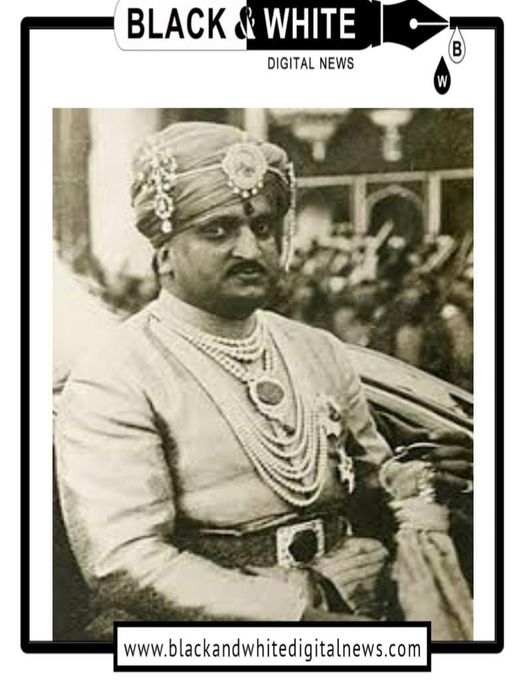The Visionary Monarch Who Shaped Jammu and Kashmir: Maharaja Hari Singh’s Legacy of Reform and Justice.
||Black and White Digital News||
||Parvinder Singh September 22, 2024||
Jammu :Maharaja Hari Singh, the last ruling king of Jammu and Kashmir, left an indelible mark on the history of India and the region he governed. Born on September 23, 1895, in Amar Mahal, Jammu, his reign, which began in 1925, was not only about governance but about bringing a wave of progressive reforms that aimed to uplift the status of every section of society, irrespective of religion, caste, or creed. His vision was not just for Jammu and Kashmir but for a united and just India. His immortal words, “As a ruler, I have no religion, all religions are mine, and my religion is justice,” resonate as a testimony to his deep-rooted commitment to equality and fairness.
From the very onset of his rule, Maharaja Hari Singh proved to be a forward-thinking ruler, focusing on eradicating social evils and uplifting the marginalized. He was instrumental in banning child marriage, female infanticide, the infamous practice of sati, and untouchability. These progressive reforms were not just limited to his Hindu subjects but extended to every community in his kingdom, including Muslims, Sikhs, Christians, and others. He believed that society could only progress when all its members were treated equally, and he made education, health, and social reform his primary focus. His reforms for women, including promoting widow remarriage and enhancing access to education and healthcare, were unprecedented at the time.
Perhaps his most profound legacy is how he fostered religious harmony. He opened the doors of temples, schools, and other public institutions to untouchables, defying the rigid social hierarchies of the time. Despite opposition, he allowed Harijans entry into Hindu temples, showing his unyielding dedication to equality. He also took numerous steps to address the grievances of the Muslim community, including restoring religious sites that had been rescinded by Mughal Emperor Akbar and granting Muslims a more substantial representation in state services.
Maharaja Hari Singh’s reign wasn’t just about social reforms; it was about economic upliftment and education as well. His establishment of the Jammu and Kashmir Bank, the High Court of Jammu and Kashmir, and the creation of over 20,000 primary schools transformed the region’s socio-economic landscape. His contributions to healthcare, particularly with the establishment of the Maharaja Hari Singh Hospital in Srinagar, ensured that his subjects had access to modern medical facilities. He also outlawed immoral trafficking, instituted primary education for all, banned child marriage, and checked corruption with unparalleled diligence.
Despite his domestic achievements, it is his political foresight and bravery that make Maharaja Hari Singh an icon. His principled stand at the Round Table Conference in London, where he advocated for Indian independence, was a bold move against British colonial powers. As the first Indian ruler of a princely state to challenge British authority, he earned global respect and recognition. His role during World War II as a member of the Imperial War Council further cemented his standing as a significant political figure on the global stage.
The Maharaja’s most critical moment came in 1947 when the newly created Pakistan launched an attack on Jammu and Kashmir. Faced with the imminent threat of invasion, he turned to India for assistance, writing a letter to Lord Mountbatten that has become a cornerstone of the region’s modern history. “If my state is to be saved, immediate assistance must be available at Srinagar,” he pleaded. On October 26, 1947, Maharaja Hari Singh signed the Instrument of Accession, thus formally integrating Jammu and Kashmir into the Dominion of India. This pivotal decision, which involved Jammu, Kashmir, Ladakh, and areas such as the Northern Territories, Trans-Karakoram, POK, and Aksai Chin, forever changed the course of history. It was a decision rooted in his belief that India was a land where people of all religions could live together in peace and harmony.
However, post-accession, political tensions emerged between the Maharaja and Sheikh Mohammad Abdullah, the then Prime Minister of Jammu and Kashmir. These differences culminated in Maharaja Hari Singh being forced to abdicate in favor of his son, Dr. Karan Singh, in 1949. The Maharaja, despite his immense contributions to the state, spent the last years of his life in Bombay, away from his beloved Jammu and Kashmir. He passed away on April 26, 1961, and as per his wishes, his ashes were spread across the state he so dearly loved.
Maharaja Hari Singh’s contributions live on not only in the reforms he brought but in the monuments that stand as a tribute to his legacy. His statues, schools, parks, and bridges, such as the Maharaja Hari Singh Tawi Bridge, the Maharaja Hari Singh Higher Secondary School, and the Maharaja Hari Singh Zanana Park, continue to remind the people of Jammu and Kashmir of the visionary king who shaped their past. His establishment of institutions like the Hari-Tara Charitable Trust and the Maharaja Hari Singh Agricultural Collegiate School Nagbani demonstrates his enduring commitment to education and welfare.
The Maharaja’s legacy is a testament to the power of justice, reform, and vision. He was a ruler ahead of his time, and his contributions continue to influence the social, economic, and political fabric of Jammu and Kashmir today. As the region continues to be a focal point of political discussions, the reforms and policies implemented by Maharaja Hari Singh serve as a reminder of a time when justice, equality, and progress were the pillars of governance.
His spirit, unyielding in its commitment to justice and equality, remains embedded in the history and hearts of the people of Jammu and Kashmir.



